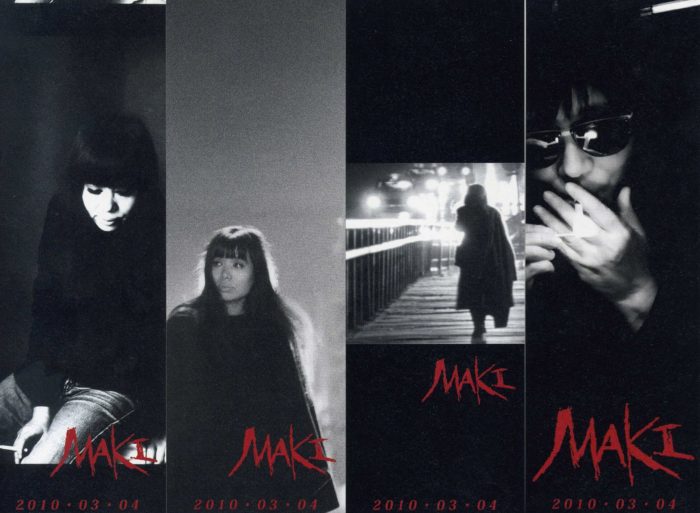Written and performed by Maki Asakawa; from an episode of the Theatre of Fear TV suspense series broadcast in February 1973.
When Terayama first heard her sing “When the Night Ends” he felt as if an electric shock had run through him...
So said Kyoko Kujo, Shuji Terayama’s ex-wife and guardian of his legacy. The electric experience described happened in the autumn of 1968. A music industry friend had taken Terayama to the “Gin Paris” coffee shop, a well-known venue for chanson and jazz, to see “an interesting singer.” At the time the 26 year old Maki Asakawa was struggling, having released an unsuitable poppy single which failed to sell, and was performing only two or three times a month.
Terayama was so excited by what he saw that he quickly wrote twelve songs for her and arranged a three day residency at the Sassori-za (“Scorpio”) theatre, a hotspot of the Shinjuku counter-culture. Here is Maki – uncharacteristically photographed in broad daylight – standing outside the venue.
The shows – which took place in mid-December, with an unusual starting time of 10 p.m. – were a sell-out and a sensation. A single and an album soon followed and Maki was re-launched as the Queen of the Underground, a role which she played perfectly until her death in 2010.
Maki was born in a tiny fishing village in Ishikawa Prefecture and worked briefly for the local government in the nearby town before leaving for Tokyo and self-reinvention.
This song is her story – and also closely reflects Terayama’s favourite themes of leaving home and rejecting family ties. It was part of Terayama’s personal mythology that he was born on a moving train and thus had no hometown of his own.
The music was blacker and bluesier than standard enka-derived Japanese pops. Maki had performed on US military bases and became known for her interpretations of songs by Bessie Smith and lyrics by Harlem Renaissance poet Langston Hughes. Terayama was brought up in Misawa, a US airforce base, and had absorbed blues and jazz from an early age. Although apparently unable to hold a note himself, he had voluminous knowledge of the music.
According to Kyoko Kujo, Maki and Terayama had similar characters… Maki was a poet too.
For a long time Maki refused to have her music released on CD, but a good selection is now available to the international audience on both CD and vinyl. Honest Jon’s, a UK independent label, released “Maki Asakawa” last year with translations of the lyrics and an enlightening introductory essay by Dr. Alan Cummings of the School of Oriental and African Studies in London.


